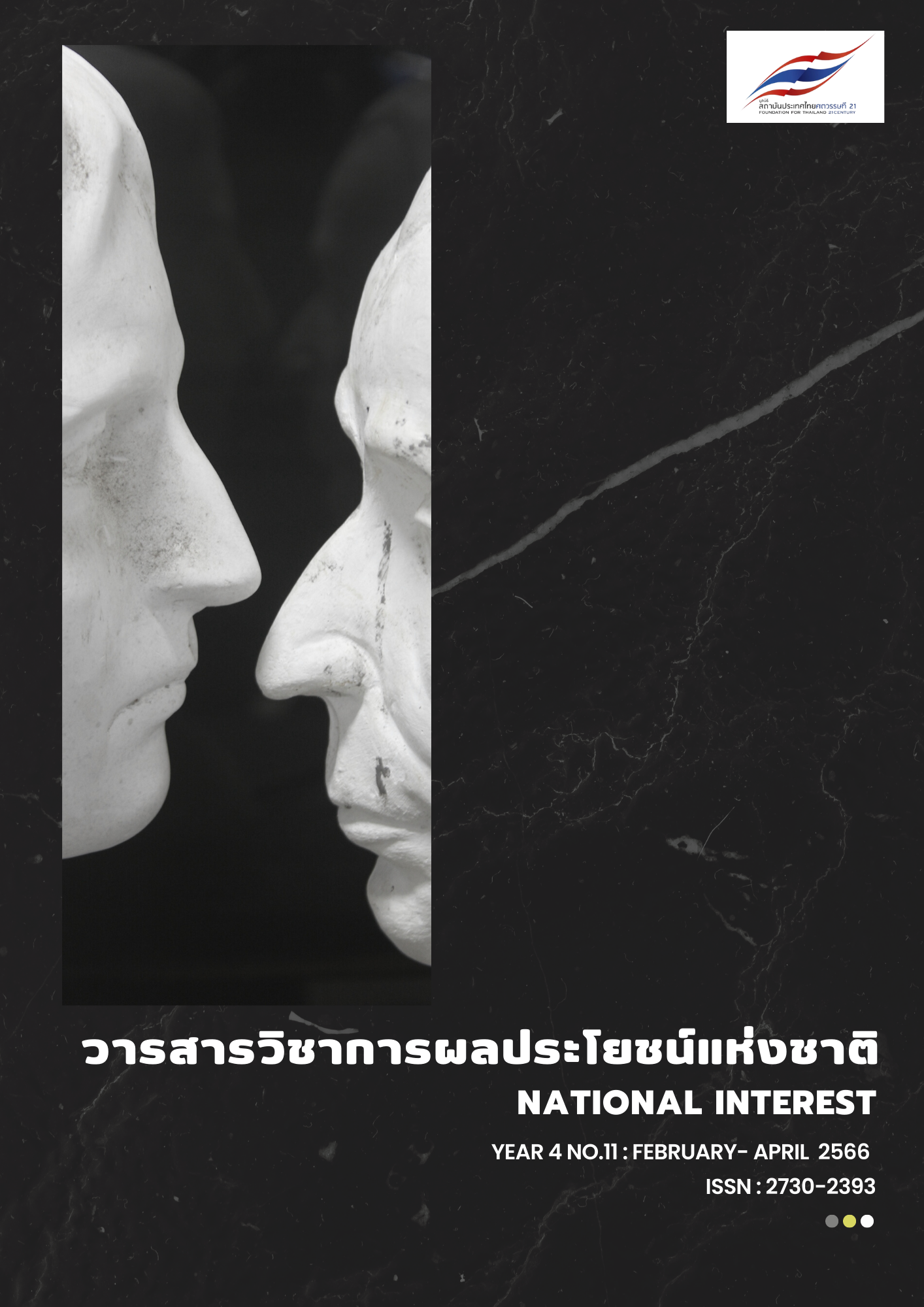The Geopolitical choices of Armenia amidst the transformation of Post-cold war global order
Main Article Content
บทคัดย่อ
The article analyzes the transformation of the Post-Cold War order, and its implications for Armenia. It argues, that after the 2007-2008 world financial crisis, the Unipolar Post-Cold War order started its transformation towards multipolairty. This transformation triggered the geopolitical competition between great powers, such as the US, China, and Russia, while the war in Ukraine brought the West and Russia to a direct confrontation. The relative decline of the US as the world sole superpower resulted in the rise of power struggle for regional dominance adding instability in different corners of the world. Located in the strategic crossroad between Russia, Middle East, Europe and Central Asia, South Caucasus has become one of the battlefields between global and regional powers vying for influence and domination. In the backdrop of rapidly changing global and regional context, Armenia faces two primary choices. To become a Western bulwark against Russia, assuming the role of Georgia under the president Saakashvili, and fostering partnership with Turkey and Azerbaijan to balance against Russia and Iran, or to strengthen its relations with Russia, India, and Iran, seeking to balance Turkey’s and Azerbaijan’s growing regional ambitions and preventing the transformation of Armenia into Azerbaijan’s and Turkey’s political and economic backyard.
Article Details

อนุญาตภายใต้เงื่อนไข Creative Commons Attribution-NonCommercial-NoDerivatives 4.0 International License.
วารสารวิชาการผลประโยชน์แห่งชาติ ภายใต้ Creative Commons Attribution-NonCommercial-NoDerivatives 4.0 International License วารสารอนุญาตให้มีการเข้าถึงหรือเผยแพร่งานทางวิชาการได้โดยไม่มีค่าใช้จ่ายหรือมีการลงทะเบียน เพื่อเป็นการสนับสนุนการแลกเปลี่ยนความรู้ ขอบข่ายครอบคลุมงานวิชาการด้านภูมิรัฐศาสตร์ ภูมิเศรษฐศาสตร์ และนวัตกรรมผู้ใช้สามารถแบ่งปัน คัดลอก และกระจายข้อมูลทั้งหมดที่ตีพิมพ์ใน วารสารวิชาการผลประโยชน์แห่งชาติ ในรูปแบบหรือสื่อใดก็ตามตามเงื่อนไขต่อไปนี้:
การอ้างอิง — อนุญาตให้นำผลงานไปใช้ ทำซ้ำ แจกจ่าย หรือดัดแปลงงานนั้นได้ แต่ต้องให้เครดิตที่มาของเจ้าของผลงานนั้น ซึ่งถ้ามีการใช้ผลงานนั้นโดยไม่มีเครดิตชื่อเจ้าของผลงานกำกับ จะต้องทำการขอนุญาตเจ้าของผลงานก่อน
ไม่ใช้เพื่อการค้า — อนุญาตให้นำผลงานไปใช้ ทำซ้ำ แจกจ่าย หรือดัดแปลงงานนั้นได้ แต่ไม่สามารถใช้ผลงานหรือบทความเพื่อวัตถุประสงค์ทางการค้าได้
ไม่สามารถดัดแปลง — อนุญาตให้นำผลงานไปใช้ ทำซ้ำ แจกจ่าย ผลงานชิ้นนั้นได้ แต่ห้ามดัดแปลงงาน เว้นแต่ว่าจะได้รับการอนุญาตจากเจ้าของผลงานก่อน
เอกสารอ้างอิง
Baku – Azerbaijan: 10 December 2020. Azerbaijan Turkey and Pakistan flags in the Karabakh Victory
Barack Obama: Russia is a regional power showing weakness over Ukraine. 2014, 25 March.
https://www.theguardian.com/world/2014/mar/25/barack-obama-russia-regional-power-ukraine-weakness
Declaration of the Summit on Financial Markets and the World Economy. (2008). Washington DC,
November 15, 2008. http://www.g20.utoronto.ca/2008/2008declaration1115.html
Deen, Bob, Wouter, Zweers, Camille, Linder. (2023). The EU in the South Caucasus, Navigating a Geopolitical Labyrinth in Turmoil. Clingendael Report,
Fukuyama, Francis. (1992). The End of History and the Last Man. NY: The Free Press.
Gordon, Nicholas. (2022). Biden’s efforts to starve China of chips are rewriting the rules of global trade–
and even U.S. allies are balking at the upheaval. December 17, 2022. https://fortune.com/2022/12/17/semiconductor-exports-free-trade-subsidies-china-ban-biden-morris-chang-tsmc/
Jaishankar, S. (2020). The Indian Way: Strategies for an Uncertain World. HarperCollins.
Lieberthal, Kenneth G. (2011). The American Pivot to Asia. December 21, 2011.
https://www.brookings.edu/articles/the-american-pivot-to-asia/
Maria Zakharova: Pashinyan's allegations about Russia posing threats to Armenia – absurd. 13 January
https://ccbs.news/en/article/6750/
National Security Strategy. October 2022.
Pamuk, Dilan. (2021). Turkey, Azerbaijan, Pakistan issue joint declaration. 14.01.2021.
https://www.aa.com.tr/en/asia-pacific/turkey-azerbaijan-pakistan-issue-joint-declaration/2109284
Pashinyan: Russian peacekeepers becoming “silent witnesses” to Karabakh depopulation. December 29,
Poghosyan, Benyamin. (2021). In the South Caucasus, Tehran has its red lines too. 04.10.2021.
https://www.commonspace.eu/opinion/opinion-south-caucasus-tehran-has-its-red-lines-too
Poghosyan, Benyamin. (2023). Persian Gulf–Black Sea Transport Corridor. February 16, 2023.
https://www.indrastra.com/2023/02/sitrep-persian-gulfblack-sea-transport.html
Prime Minister Nikol Pashinyan holds press conference. 10.01.2023.
Staff, Asbarez. (2022). Armenia’s Security Chief Angers Kremlin After Claiming Yerevan is ‘Forced to
Join Russia-Belarus Union’. December 27, 2022. https://asbarez.com/armenias-security-chief-angers-kremlin-after-claiming-yerevan-is-forced-to-join-russia-belarus-union/
Stepanian, Ruzanna, (2022). Armenia ‘Forced To Join Russia-Belarus Union’. 27.12.2022.
https://www.azatutyun.am/a/32195524.html
Speech and the Following Discussion at the Munich Conference on Security Policy. 2007-02-10.
http://en.kremlin.ru/events/president/transcripts/copy/24034
Survey: Growing skepticism in Armenia about Russia, even before recent fighting. 20 Sep, 2022.
Tharoor, Shashi, and Saran, Samir. (2020). The New World Disorder and the Indian Imperative. Aleph
Book Company.
Trabzon Declaration of the Ministers of Foreign Affairs of the Republic of Azerbaijan, Georgia and The
Republic of Turkey. 08 June 2012, Trabzon. https://www.mfa.gov.tr/trabzon--declaration-of-the-ministers-of-foreign-affairs-of-the-republic-of-azerbaijan_-georgia-and-the-republic-of-turkey_-08-june-2012_-trabzon.en.mfa
US National Security Strategy. December 2017.
https://trumpwhitehouse.archives.gov/wp-content/uploads/2017/12/NSS-Final-12-18-2017-0905.pdf


